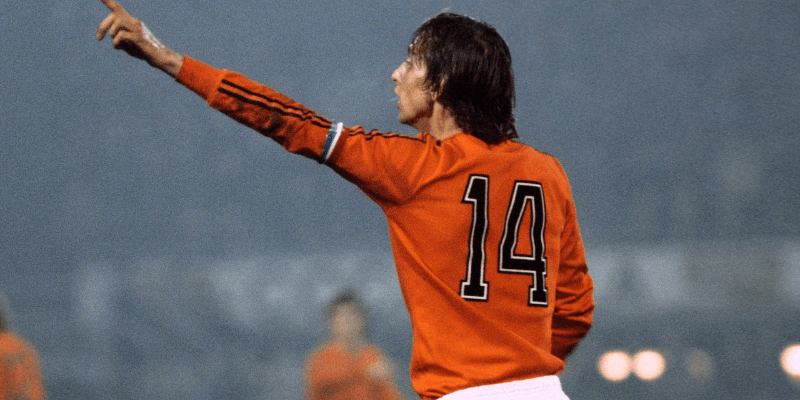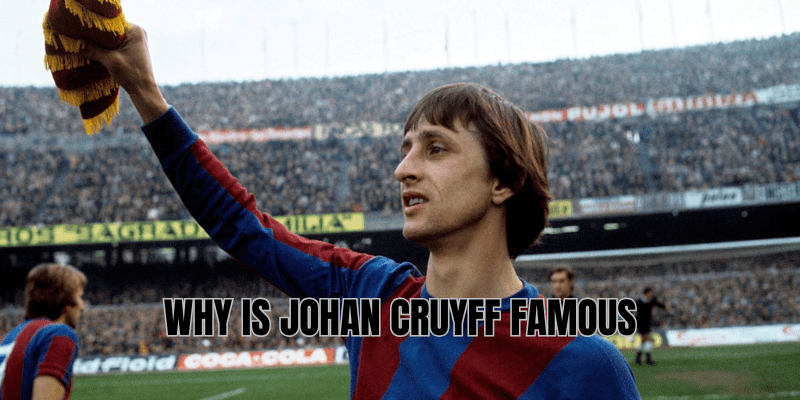When football fans ask why is Johan Cruyff famous, they’re not just asking about a star from the past — they’re tapping into the source code of modern football. Cruyff was more than a dazzling dribbler or trophy-winner; he was a visionary whose ideas rewrote how we think about the game. In this article, TigerKick will take you through the life, legacy, tactics, and influence of Johan Cruyff — and show you why his fame still echoes in every pass, every youth academy, and every bold tactical shift today.
The rise of a Dutch master

Johan Cruyff (born Hendrik Johannes Cruijff, 1947–2016) was raised in Amsterdam, in a working-class neighborhood a stone’s throw from Ajax’s stadium. Even. He joined Ajax’s youth ranks and progressed rapidly into the first team, making his senior debut in 1964 in the Eredivisie., Cruyff became the beating heart of Ajax’s golden era. He scored a huge number of goals and provided countless assists, anchoring a side that would dominate both domestically and in Europe. In 1973 he transferred to Barcelona — at a then world-record fee — and immediately helped restore Barcelona’s prestige, leading them to their first La Liga title in 14 years.
Internationally, Cruyff represented the Netherlands.
His trophies, his flair, and his consistency were impressive — but fame is rarely built on numbers alone. Cruyff became legendary because he reshaped what football could be.
The philosophy: Total Football and footballing intelligence

At the core of Cruyff’s fame lies his embrace—and evolution—of Total Football. This was a system where positional boundaries blur: defenders become attackers, attackers drop back, midfielders move wide. What mattered most was movement, intelligence, and spatial awareness.
The role of the “conductor”
Cruyff didn’t just play inside Total Football — he embodied it. On the pitch, he acted like a maestro, orchestrating movement, instructing teammates, and deciding where space ought to open. His vision and reading of the game made him almost telepathic — he’d anticipate runs, pull defenders, and exploit gaps before many defenders knew they existed.
Style beyond tactics
For Cruyff, football wasn’t just a tactical puzzle — it had to be beautiful. He often said, “Quality without results is pointless. Results without quality is boring.” He believed the aesthetic dimension — playing with grace, confidence, and intelligence — was essential. Even in victory, style mattered.
His ideals influenced how coaches thought about training, pressing, possession, and even youth development. Over time these “Cruyffian” ideas have filtered into many top teams worldwide.
Success as man and manager

Cruyff’s fame was not just as a player — his managerial and advisory roles added gravitas to his legend.
Managerial achievements
After retiring, Cruyff took charge of Ajax (1985–1988) and later Barcelona (1988–1996). At Barcelona, he built the foundation for the club’s modern identity: fast, possession-based, attacking football. Under him, Barça won four consecutive La Liga titles and secured their first European Cup in 1992.
His coaching style mirrored his playing philosophy — positional interchangeability, emphasis on technical skills, and youth integration. He saw players not as fixed pieces, but fluid puzzle parts.
Long-term influence
Even after he stopped managing, Cruyff remained deeply involved. He advised Barcelona presidents, influenced hiring decisions (notably setting the stage for Pep Guardiola’s rise), and publicly critiqued or supported footballing policies and trends.
His legacy spread through the coaching “family tree”: coaches who studied under or took influence.
Records, honors, and signature contributions
To appreciate why is Johan Cruyff famous, one must also look at what he left behind in terms of records, honors, and lasting contributions.
Awards & recognition
- Three-time Ballon d’Or winner (1971, 1973, 1974)
- Golden Ball best player at the 1974 World Cup
- Heavily decorated at club level with Ajax and Barcelona: multiple league titles, three consecutive European Cups with Ajax, domestic cups, and more
- As a manager, his trophy haul with Barcelona and Ajax was substantial, including Europe’s top club trophy with Barça in 1992
Signature moves and symbols
One of the most iconic legacy pieces is the Cruyff turn (aka “Cruijff turn”) — a deceptively simple yet brilliant dribbling move that has become part of football folklore.
Also, institutional honors keep his name alive:
- The Dutch Super Cup is known as the Johan Cruyff Shield
- Young talent awards in the Netherlands carry his name
- Ajax retired the number 14 in his honor
These symbols ensure that even casual fans learn of him.
Enduring footprint: influence on modern football
What continues to make Johan Cruyff famous is the way the game still carries his fingerprints.
Tactical DNA in today’s game
Cruyff’s ideas made possible what we see today: possession dominance, positional flexibility, pressing, inverted full-backs, and control-based attacking play. Coaches like Pep Guardiola, Mikel Arteta, and countless others have publicly stated how much they draw from Cruyff’s teachings.
For example, the trend of deploying full-backs who drift inside or take central roles stems partly.
Cultural and academy impact
Cruyff’s philosophy didn’t just stay in senior squads. He pushed the idea that youth academies must teach style as much as skill. He saw football development as holistic — not just about winning youth matches, but about instilling intelligence, creativity, and identity. Clubs like Barcelona’s La Masia were shaped by this ethos.
Through his foundation (which built youth “Cruyff Courts”) and institutions, he also linked sport to social impact — helping young players worldwide gain access to football spaces.
Why Is Johan Cruyff Famous: summary in a snapshot
To sum it up:
- He was a generational genius on the pitch — a top scorer, assist master, and tactical director for Ajax, Barcelona, and the Netherlands.
- He embodied and elevated Total Football, becoming its greatest exponent and boosting it into global influence.
- As a coach and advisor, he reimagined football culture, especially at Barcelona, leaving structural changes that outlasted his tenure.
- His awards and signature contributions (Cruyff turn, youth awards, clubs’ cultural identity) cement him in the memory of football history.
- His tactical philosophy permeates modern football —.
Conclusion
Why is Johan Cruyff famous? Because he transformed football from within — as a player, a coach, a philosopher, and a cultural icon. His name is not just celebrated for trophies or flair, but for changing how the game is played and understood at every level.
TigerKick invites you to explore more: dive into the evolution of Barça’s style, the coaching tree born from Cruyff’s thinkers, or a tactical dissection of modern teams that still wear his imprint. Let his legacy teach you how the beautiful game truly became beautiful.



